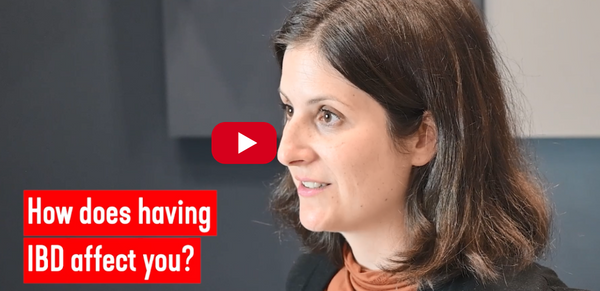Inflammatory Bowel Disease (IBD): A Patient, a Nurse and a Doctor Answer Your Questions!
In Canada, more than 300,000 people are affected by IBD. The most common are Crohn’s disease and ulcerative colitis.
To better understand the reality of people affected by these diseases, a courageous advocate, Camille Lemay; a devoted nurse, Kelly Chavez; and a charismatic physician, Dr. Talat Bessissow, answer all your questions.
Camille Lemay has been living with Crohn’s disease for several years and is a patient at the IBD Clinic of the McGill University Health Centre (MUHC). She explains the main challenges of living with this disease. She is also the creator of the podcast Deuxième porte à gauche (in English: second door to the right), in which she seeks to inform and break down the sense of isolation that is too common among people with IBD.
Kelly Chavez is an IBD nurse at the Montreal General Hospital (MGH). In 2021, she was selected as IBD Nurse of the Year by Crohn’s and Colitis Canada.
Dr. Talat Bessissow is a gastroenterologist at the MGH. His research focuses on the role of mucosal healing in IBD, the detection of neoplasia in ulcerative colitis as well as improving disease related outcomes.
Causes, Symptoms, Treatments and Resources: Everything You Always Wanted to Know About IBD

As Dr. Bessissow explains in the interview, inflammatory bowel disease (IBD) is a chronic condition involving inflammation of the intestine. The most common are Crohn’s disease and ulcerative colitis. Many researchers are trying to understand why the body, along with the immune system, chooses to attack the intestines, but the reasons remain a mystery, although some evidence may point to genetic and environmental components.
Common symptoms include abdominal cramps and pain, rectal bleeding, weight loss, loss of appetite and even stunted growth in young people. However, as nurse Kelly Chavez explains, it’s also possible to see symptoms other than those of the digestive system, including some that involve the skin and eyesight.
Learning to Live with Crohn’s Disease
Camille Lemay has had Crohn’s disease for several years. She has had her share of challenges, and now lives with a stoma. We asked her about the daily impact of the disease on her life: “Honestly, it’s a lot of adjustments, and it affects all areas of my life and those of my loved ones,” she says.“The mental health aspect isn’t talked about enough in the early stages of the journey, in my opinion. It’s possible to experience anxiety and depressive periods, and the key is to manage your energy, but it’s not easy,” she admits.
Is there a cure for IBD?
There are treatments available for IBD. For ulcerative colitis, most people will respond well to anti-inflammatory medication. For those for whom this is not the case, and for people with Crohn’s disease, immunosuppressive drugs are preferred. The aim is to control the disease and maintain as normal a quality of life as possible.
‘’Eventually, we certainly hope for a breakthrough that will enable a complete cure for our patients,” says Dr. Bessissow.
*The McGill IBD Research Group raises funds to support the best possible care for patients living with Inflammatory Bowel Disease (IBD), an umbrella term used to describe disorders that involve chronic inflammation of the digestive tract such as Crohn’s Disease and Ulcerative Colitis. The Group’s mandate is to provide expert medical care, services, research and resources to those living with IBD as well as their families.







